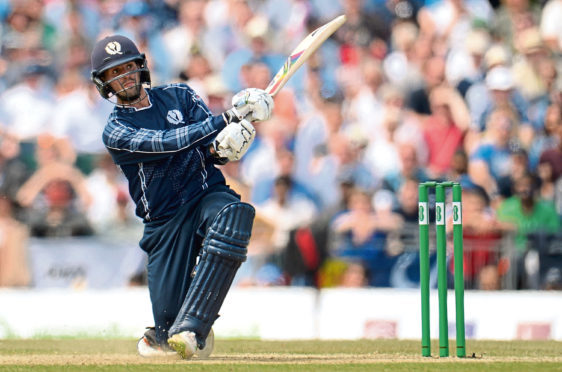The Rolling Stones might have performed at Murrayfield last weekend, but nothing rocked Edinburgh – and the wider world – more than the victory of Scotland’s cricketers over England at Raeburn Place in Sunday’s ODI match.
In the one corner were the visitors, who are currently ranked No 1 in the global rankings and whose players are richly remunerated for their efforts with bat and ball.
In the other, the Scots are currently existing on a hand-to-mouth basis, lacking a major sponsor, and have been denied the opportunity to appear at next year’s World Cup by the governing body, the ICC, which has reduced the number of competitors from 14 to 10 in 2019.
Yet, despite the travails endured by the white flannel brigade, they are at least enjoying plenty of applause, following their first-ever win against the English in the sport. First Minister Nicola Sturgeon tweeted her congratulations, the team will be praised in a motion at Holyrood later this week and their exploits have been celebrated from Cape Town to Kolkata and Auckland to Adelaide.
None of that is likely to transform the widespread apathy about cricket which exists among even sporting aficionados north of the Border. But the strange thing is that it has been at the heart of Scottish society since the early 1800s, not least in the north east, which remains one of the bastions of the game.
In recent years, its popularity may have dissipated in some communities, but as the late Mike Denness – who captained England in the 1970s – once said: “When I grew up, you played football in the winter and cricket in the summer, and everybody was happy. There is no reason why we can’t be good at cricket. But, for some reason, it has become Scotland’s secret game.”
Kyle Coetzer, the 34-year-old Aberdonian, who orchestrated his country’s success on Sunday, perhaps sums up the situation. He has starred on the English county circuit at Durham and Northants, struck a magnificent 156 for Scotland at the last World Cup in 2015, and is a consummate professional, on and off the pitch. But the former Stoneywood-Dyce player could walk down Union Street without gaining a second look.
Why? Coetzer doesn’t have an explanation, although as he told the Press and Journal last month: “We don’t get many opportunities to play the likes of England and Pakistan (whom his side tackle in two T20 contests in Edinburgh today and tomorrow). So we have to grab them with both hands.”
It’s a problem which has bedevilled generations of his compatriots. But maybe it’s time to remind the sceptics how cricket was being played in Scotland long before the SFA and the SRU, let alone the Old Firm and Aberdeen, Hearts and Hibs, had even come into existence.
Aberdeenshire Cricket Club, for instance, was established in 1857, following in the footsteps of Kelso (1821), Grange (1832) and Clydesdale (1848). The first recorded match in Scotland took place at Alloa in Clackmannanshire as far back as 1785. And, although the game has been overtaken by other pursuits, there have been plenty of notable achievements to celebrate.
In 1882, for example, the Scots took on and trounced Billy Murdoch’s all-conquering Australian tourists in Edinburgh. In the 1930s, Douglas Jardine, born in India to Scottish parents, skippered the English to success in the so-called “Bodyline” series Down Under, which subsequently sparked acrimonious political arguments between the British and Australian governments.
There was more fun and less ferment when the players of Freuchie surged to victory in the National Village Cup at Lord’s in 1985. No less than 639 clubs challenged for the prize, but it was Dave Christie’s rustic warriors and their community who travelled en masse to London – after crossing the Forth Road Bridge twice because the TV cameras messed up the first take – and prompted a pitch invasion at the home of cricket by defeating Surrey side Rowledge in the final.
Christie is now 81, and he is still in thrall to the game which he has relished since he was growing up in Fife during the 1940s and 1950s.
As he said: “It has changed a lot down the years, but I’ve played all over Scotland and we went down to England with Freuchie often enough and there isn’t any difference between us and them.
“If people don’t like cricket, that’s fine. But I have never been able to fathom why some folk up here have this prejudice against it.
“Cricket in Scotland is played by people of all ages and backgrounds. When we went down to London, there were nearly as many women as men on the journey. And we all loved the experience.”
Coetzer and Co will return to their clubs and revert to performing in front of 20 or 30 fans. Doubtless, the football World Cup will soon be the main topic of conversation in Scotland, despite our absence.
But that won’t lessen the impact of Sunday’s seismic victory. The message of that unexpected result seems to echo the 10cc hit song: “We don’t like cricket – we love it!”
